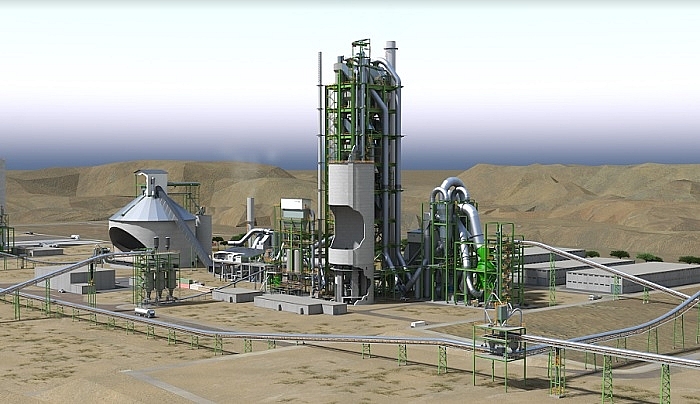Turning industrial waste into gold
 |
According to the Ministry of Construction’s figures, the total amount of solid waste collected in Vietnam was estimated at 15.6 million tonnes per year at the end of 2017. Around 71 per cent of this went to landfills, while only 29 per cent underwent intermediate processing. Some 23 per cent of total waste was processed and recycled and the remaining 6 per cent of residue from composting or burning facilities were buried. This resulted in 77 per cent of municipal solid waste (MSW) in Vietnam ending up in landfills.
In Vietnam, MSW processing plants commonly use organic composting or burning technology, while disposing waste at landfills causes a negative impact on the environment. There are many reports of foul odours emanating from landfills, which seriously affect sanitation and the lives of the people living around the area. In addition, groundwater contamination and methane emissions from landfills exacerbate climate change.
“Not to mention the risk of the uncontrolled growth of landfill sites. In spring 2017, a huge landfill site near Colombo in Sri Lanka collapsed after heavy rainfalls. More than 150 houses were buried under hundreds of tonnes of waste and 24 people were killed,” Thomas Loesche, CEO of Germany’s Loesche GmbH, told VIR.
Cement production is an industry that contributes significantly to the mitigation of environmental pollution by utilising waste from thermal power plants, metallurgical facilities, and chemical plants. Industrial waste such as slag from blast furnaces, slag and fly ash from thermal power plants, as well as pyrite slag and gypsum recovered from chemical plants have been used as raw materials and additives for cement production.
In its efforts to find a better solution for waste treatment, Loesche has created an MSW processing mill with a capacity of up to 200 tonnes per hour and developed a processing technology that allows the separation of specific combustible components such as plastics, paper, and wood.
Loesche has also supplied mills that treat sewage sludge –the conventional treatment of which is quite expensive–together with MSW. Forty per cent sewage sludge is mixed into normal MSW to produce a wet, organic portion and a high-quality burnable portion – the ideal material for pre-calciners in cement plants today. Sewage sludge that was treated in this way loses its notorious stench and decomposes more quickly.
The number of existing landfill sites has declined due to Loesche’s drive. Its technology could also help reduce the size of existing landfill sites and create more fuel for the cement industry.
“We produce environmentally sound and odourless waste treatment plants that separate the combustible components from the organic matter. The combustibles can then be burned in cement plants and the organic material can be either deposited in controlled landfill sites or used in re-cultivating measures in open limestone mines,” Loesche explained.
The possibilities are shown in Austria, where Loesche’s subsidiary A TEC has converted two old cement plants into some of the most modern plants in the world, both of them fired with over 90 per cent processed waste.
In Vietnam, INSEE Vietnam (previously known as Holcim), a subsidiary of Siam City Cement, has already gained benefits from using Loesche machines in solid waste pre-processing, automatically feeding liquid waste into cement kilns, operating and controlling waste disposal in cement kilns, and co-processing of non-recycled waste with a reduction in carbon dioxide (CO2) emissions with no ash residue.
This approach has impressed the leaders of Vietnamese ministries and agencies. “I appreciate this technology and Loesche’s sharing of experience in processing solid waste into fuel,” said Deputy Minister of Construction Bui Pham Khanh.
Tong Van Nga, chairman of the Vietnam Association for Building Materials, also said that with the experience gained over years of co-operation with Vietnam’s cement industry, Loesche GmbH has directly transferred technology and equipment and joined equipment manufacturing with Vietnamese mechanical firms, which has helped Vietnamese cement plants achieve their targets in reducing electricity and thermal energy consumption throughout the cement production process.
“I do believe that Loesche will continue to succeed in combined waste treatment and provide substitutes for part of the conventional fuels used in cement production,” Nga said.
What the stars mean:
★ Poor ★ ★ Promising ★★★ Good ★★★★ Very good ★★★★★ Exceptional
 Tag:
Tag:
Related Contents
Latest News
More News
- Pegasus Tech Ventures steps up Vietnam focus (February 05, 2026 | 17:25)
- The generics industry: unlocking new growth drivers (February 04, 2026 | 17:39)
- Vietnam ready to increase purchases of US goods (February 04, 2026 | 15:55)
- Steel industry faces challenges in 2026 (February 03, 2026 | 17:20)
- State corporations poised to drive 2026 growth (February 03, 2026 | 13:58)
- Why high-tech talent will define Vietnam’s growth (February 02, 2026 | 10:47)
- FMCG resilience amid varying storms (February 02, 2026 | 10:00)
- Customs reforms strengthen business confidence, support trade growth (February 01, 2026 | 08:20)
- Vietnam and US to launch sixth trade negotiation round (January 30, 2026 | 15:19)
- Digital publishing emerges as key growth driver in Vietnam (January 30, 2026 | 10:59)

















 Mobile Version
Mobile Version